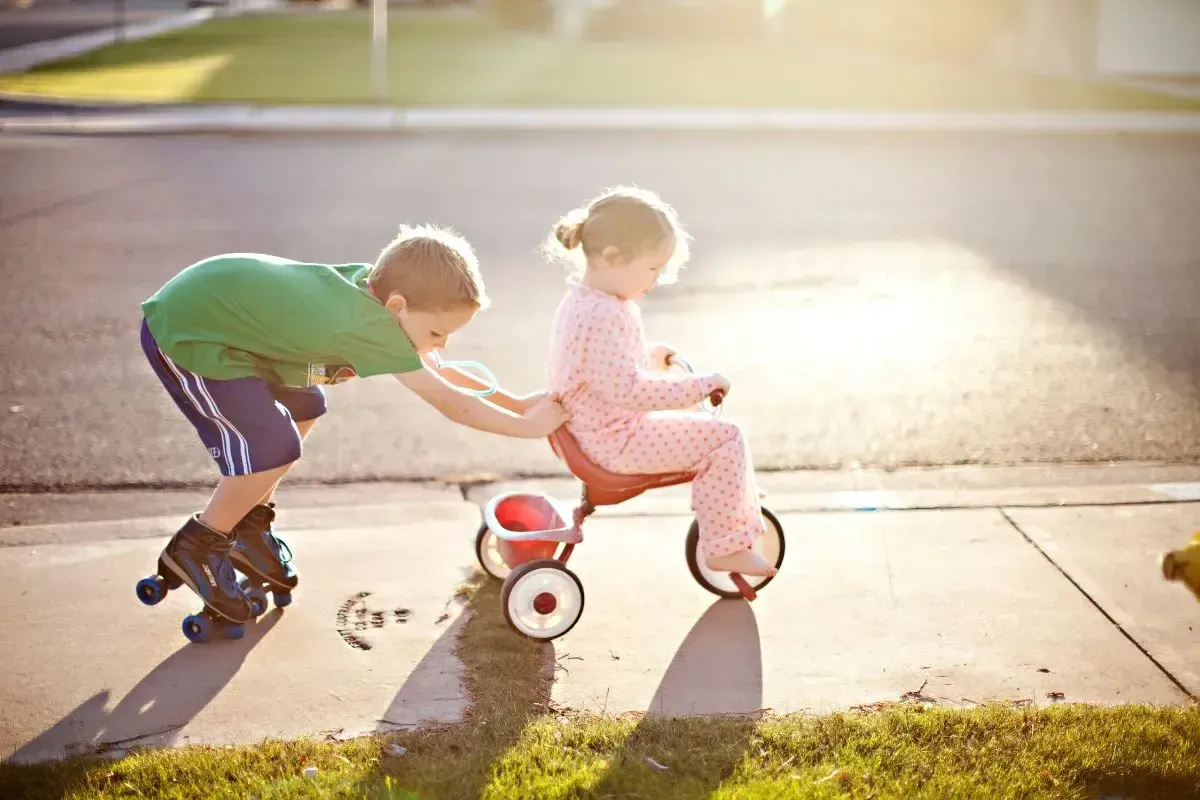
What effects do sibling relationships have on us, and what can you do as a parent to help your children?
We commonly struggle with how our parents’ upbringing shaped us. However, sibling connections shape us to a considerable extent as well. The order in which we were born also has an impact. What role do sibling relationships play in shaping our personalities, and what can you do as a parent to help your children find their way to you?
Our personalities are shaped by our siblings’ positions.
Every child has a unique function in respect to his or her siblings, and this influences who we become as adults. We examine all types of sibling relationships, from first-born to only children.
The birth of a sibling is difficult for firstborns.
We practically have to start sharing a parent overnight after the arrival of a sibling. Jealousy and emotions of being overlooked can develop. When the firstborn is one to seven years older than the sibling, these feelings are most intense. As a result, it is critical to prepare the older child for the sibling. How?

- Share the excitement of having a sibling with your child during pregnancy. Allow him to stroke your developing tummy or examine the ultrasound images.
- If the baby is a little older, include him in the decision-making process for new baby equipment. Where should the changing table and crib go? What should their color be?
- Sort through old toys that are too infantile for your older child and place them in the baby box. But only those that the older sibling wishes to pass on to his or her children.
- Accept support from the older child after the delivery and always praise him. Allow him to stand by the crib for a few moments before making a phone call or removing a soiled diaper, for example.
Because they have had to care for a younger brother or sister at times, older siblings tend to be responsible in maturity. They also enjoy taking on leadership roles. Parents, on the other hand, frequently have high expectations of their children and project their own wants onto them. They are excellent students, but they are perfectionists who have high expectations of people around them.
Second-born sibling is racing
The second child sees life as a race and frequently attempts to outrun the first. It looks up to him and wishes to learn everything he knows. However, once the third child is born, he or she faces a difficult scenario. He tries to catch up to the eldest while keeping his place in regard to the youngest. He is the one who must adapt and recede the most.
He may envy the elder brother or sister for the advantages he has due to his age, and he may envy the younger one for the excellent care and educational facilities.
Second-borns are sometimes referred to as “sandwich babies.” They manage to avoid their parents’ attention. They are, nevertheless, more likely to learn independence and social skills. They have no trouble getting along with others and are frequently tactful. They also have an easier time finding their place in life.

The youngest sibling
We frequently consider of them as spoiled and difficult, but this isn’t always the case. They can, however, be prone to scheming and blaming others. In fact, kids frequently get away with it when they are around their parents. Parents frequently have a warm spot for them, but older siblings also nurture them. They will not tolerate the youngest among them if he accuses and blames others.
Because they were cared for by both parents and siblings, the youngest children are accustomed to the care and attention of others. As a result, people may struggle to accept responsibility. On the other side, they are carefree and get along well with others.
 The stigma associated with only children
The stigma associated with only children
Growing up as an only child might make it tough for a child to blend in and find new friends. This frequently continues until adulthood. That is why it is critical for an only kid to interact with other children as often as possible.
There are also many misconceptions regarding only children that can make their lives tough. Common stereotypes include pampering or a generally poor relationship with parents. Of course, this is possible, but it all depends on upbringing. Only children can be spoiled and preoccupied on their parents if their parents are overprotective, but they can also be quite independent because they do not have siblings to ‘have their back’.
Interestingly, psychologists also consider siblings who are seven or more years apart in age to be only children.
Can you impact how the kids interact?
The chemistry of interpersonal connections determines whether children grow attached to each other and develop sibling love to some extent. However, the family’s relationship and communication settings are also quite significant.
Negative influences include:
- One sibling is being singled out more than the other. The younger daughter, for example, becomes “mommy’s little girl,” whereas the older boy “simply gets bad and causes trouble.”
- Overestimation of the’more vulnerable’ younger child’s demands at the expense of the ‘less urgent’ needs of the older child. It is capable of handling itself.
- The disparity in how children of various genders are treated, as well as the desire to ensure “equality” at all times. For example, when only the daughter is required to assist in the kitchen.
Surprisingly, even as siblings, we do not share the same parents. Parents of first-born children are still adjusting to their new role and learning how to walk in it. As a result, they always approach parenting through the lens of their current experiences.
Children reflect our own psychological state
Children’s relationships are also influenced by the (dis)harmony that prevails in our parent-child relationships. This is not only about our relationship with our partner, but also about broader family or professional links. Children notice this and readily incorporate them into their own life.
As parents, it is critical that we do not leave any disputes unsolved, that we accept our past, and that we maintain good connections. Work on both your childhood “fears” and your current troubles and conflicts.
As a parent, you cannot control your children’s fate totally, but you may set a positive example for them that will serve as their role model in life. However, until you have your own life in order, parenting manuals will be ineffective.

The first step towards healthy family relationships
Want to take the first step towards healthy family relationships or resolve a traumatic past? Online therapy can be a great solution. We have over 100 certified therapists available at Hedepy. Plus, you can join a therapy session from the comfort of your own home.
If your children’s relationships are seriously damaged, remember that it’s not just the child who is suffering that needs professional help, but the whole family. At Hedepy, we offer therapy for teenage children and the whole family can join in therapy by appointment with a therapist.
Don’t face it alone
Finally, we would like to tell you the last and most important thing. It is completely natural to experience a wave of emotions in a difficult situation. Every crisis has its beginning, but it also has its end. Yours too. Therefore, if you are at least considering it even a tiny bit, ask for the help of a psychologist, psychiatrist, psychotherapist, or coach. Don’t face it alone; you can find help – At Hedepy.cz, there are more than 30 therapists. You can choose someone who is best suited to your needs, and make an appointment for the next day. You can then connect with the therapist online, from the comfort of your own home.Thinking about therapy?

My First Therapy: How to Prepare and What to Expect

What is psychotherapy? And who is it for?


